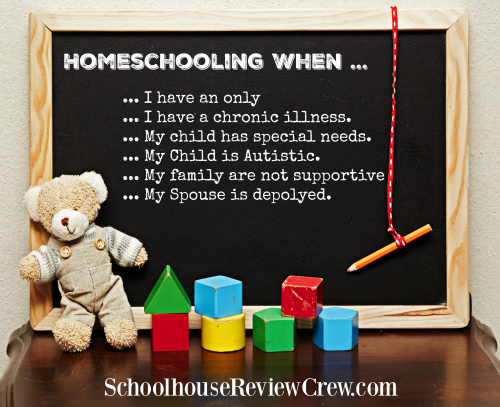We are homeschooling our only child, a lovely fourteen year old daughter named Amber, who also happens to have multiple chronic illnesses. Our situation does not fit into the mold of the typical homeschool family or is it easy to find inspiration from others who have walked this same path.
We've struggled to discover the way meant for us over the years since we first started homeschooling our then fourth grader. Our missteps have been frequent; from pursing too many activities outside the home where we just exhausted ourselves to multiple educations methods and feeling a failure at them all because we weren't purists.
What I have learned through these more than four years of mistakes is so simple, but I wish someone would have hit me over the head with the knowledge years ago.
1. It's allowed to forgo a set daily schedule in favor of looser blocks of school time.
Don't set an ideal, yet unrealistic, daily schedule in your pretty homeschool planner and then beat yourself up each day when it doesn't happen. Some days will be better than others when dealing with chronic illnesses. It's ok to adjust the school schedule and even subjects day by day.We're test driving a block schedule right now, where each morning we decide on the two or maybe three subjects of the day based on Amber's appointments, physical stamina, and mental abilities. Each day still has the same number of potential school hours, only less structured and more easily adapted for Amber's fluctuating abilities.
2. Lesson plans are still allowed and even needed, but we don't have to be a slave to them either.
Lesson plans waiting for each subject in my homeschool tracking software make it easy to change the schedule and pop in a different subject when Amber's physical and mental abilities do not fit my intended lessons for the day. However, just because in my planned lesson I listed out four possible reading sources, it doesn't mean she has to read all four in one sitting. Or work the science lab the day she does the book work. Lessons are adjustable too.
After finally deciding we were best suited to the Classical education method, I was crushed when it was obvious Amber could not handle that amount of daily work and she sometimes even needed a break from all things classical. Through modifying Amber's education style to fit her needs, I've come to understand that we can indeed still follow the main precepts of a classical education although we aren't purists. We still call ourselves classical homeschoolers, even if we are a bit eclectic in our implementation.
4. Homeschooling an only child doesn't mean we need to constantly seek out social interaction.
Having an only child with chronic illnesses is like a double whammy. She doesn't have built-in playmates and can feel isolated in her illnesses. We do try to get out and be social with friends as often as reasonably possible. Amber attends homeschool co-op enrichment classes one day a week, participates in church youth functions, goes to the homeschool group teen activities, and hangs out with her friends. We struggled for many years to find the right balance of activities and home time while learning it's not about getting a check mark in the infamous "socialization" box. Instead our efforts are simply because Amber likes to be with people. But people also exhaust her and she can't take the social interaction every day. Some days it's good to be quietly at home working on school and household chores. And that's ok, even if she's an only child.
5. High school isn't as scary as it sounds.
Take a deep breath and remember it's still the same child you've been raising for years. Tracking credits isn't the big, bad chore you fear it will be. Finding a college or university to accept your homeschooled child also isn't your worst nightmare. There are more options than closed doors. A cookie cutter replica of the local high school isn't necessarily the best way to prepare your child for the future, especially one with chronic illness. Find topics that interest your child and use those to fulfill as many graduation requirements or college entrance needs as possible. Remember not everyone has to take advanced physics.


I love the simplicity with which you are pursuing what is right for Amber. Your clear and simple tips are helpful and I can totally see them being appropriate for anyone, even if they don't have the added difficulty of chronic illness.
ReplyDeletegreat post and a lovely reminder to take our children as they are... illnesses, special needs or not. good read this was. :)
ReplyDeleteLovely post! You do such a great job and Amber does so well under tricky circumstances :)
ReplyDelete